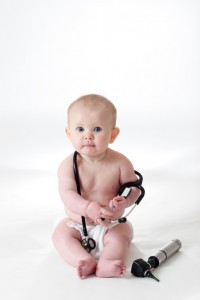[box type=”blank” align=”center” class=”border-dashed2″] So you think your kid has reflux? Then it’s time for a quick jaunt over to your local pediatrician. Only to find that your pediatrician doesn’t have a concrete diagnosis for you. Wait….what?!?! Why not? You’re a DOCTOR right? You went to MEDICAL school? Why can’t you tell me why my baby is so miserable? Isn’t that your JOB?
The truth is that diagnosing reflux is REALLY hard to do. Don’t believe me? You probably shouldn’t, I’m not a pediatrician.
Which is why I asked our beloved pediatrician, Dr. Steve Hale of Essex Pediatrics (Essex, VT) to weigh in on the subject. And for some mysterious reason he agreed.
[/box]
From the Desk of Dr. Hale
As a practicing pediatrician, when a get a call from a parent wondering if their baby has reflux, my first thought is to make sure there isn’t something else going on. Reflux seems to be an “in” diagnosis currently and I don’t want to miss something more important. So I will ask the parents to bring in their baby to rule out any other problems. I’m looking most importantly for a good weight gain. Adequate weight gain in the first few months makes me feel more confident that there isn’t a concerning illness lurking.
If, after checking out the infant I’m confident there is not a troublesome medical problem going on because the exam, weight gain and history are reassuring, then I am left with a crying, screaming, healthy baby and exhausted, frustrated, end of their rope parents!
The question is, could this be reflux? My baby eats and is growing but seems uncomfortable, arches, screams, and is always irritable. In those moments he/she is not doing these things they are adorable and meeting all their developmental milestones. The only problem is the only time they are happy is when someone else is watching them or of course when you come to the doctor and they are perfect for the 30 minutes you are there.
The answer is, of course it can be reflux, because all babies reflux. Gastroesophageal reflux is simply fluid from the stomach coming up into the esophagus which happens around 30 times a day for most infants. If it comes out of their mouth it is spitting or vomiting. The peak age of reflux is 4 months and most kids stop spitting up by 18 months of age. We all reflux daily throughout our lives.
Gastroesophageal Reflux Disease?
Gastroesophageal reflux disease is what they call it if the reflux causes symptoms that are a problem. And here is where it gets tricky. All the experts agree that infants reflux but studies are unclear when, if ever, it causes problems. When they record episodes of reflux using an esophageal pH probe, the episodes don’t always correlate with when the baby is crying and unhappy. So there is no convincing medical research that says yes, your arching, crying, screaming baby is doing all that because of reflux. Even worse, studies on treatment of suspected reflux don’t show that medication is helpful. But meds are used all the time for reflux you say! You are right and that is because we are desperate to help these exhausted parents, and some time it does seem to help but the evidence is not scientifically strong.
[pullquote type=”1″ align=”left”]
The pediatric literature in the last several years has had big studies showing meds don’t help reflux and pushing us primary pediatricians to use less medicine. The big conclusion is that reflux does not equal pain.
[/pullquote]Ok, you say, I want proof my child has reflux, then I can decide what to do. Well the best way to diagnosis reflux is by upper endoscopy where they sedate the infant and put a scope down the esophagus into the stomach and take biopsies along the way looking for inflamed tissue. But even that is not foolproof, with some babies showing inflamed tissue but no symptoms and others with normal endoscopy but a lot of symptoms. So it doesn’t seem worth it in most situations to put a baby through that for an uncertain answer.
So back to the exam room with the screaming baby and crying mom, what do I do. Well, what I do is born out of my experience and my reading of the literature and may be different from my partners. I am constantly reevaluating and trying to figure out for each family what is going to work best.
Reflux Management Strategies
 I start with safe interventions that might help. Positioning the baby on their stomach at about a 30 degree angle is the least pressure on the stomach and does decrease reflux. We don’t let them go to sleep like that though because sleeping on their back is safest to prevent SIDS.
I start with safe interventions that might help. Positioning the baby on their stomach at about a 30 degree angle is the least pressure on the stomach and does decrease reflux. We don’t let them go to sleep like that though because sleeping on their back is safest to prevent SIDS.
Thickening feeds helps for those kids who are bottle fed as it is heavier and takes more force for food to come out of the stomach. We then will try things we use for colic ( which is virtually indistinguishable from reflux ), such as having mom eliminate dairy from her diet if she is nursing, trying infant gas drops, trying hypoallergenic formula for those babies being formula fed. I usually try to make one change at a time and try it for several days to see if it works and because I know this is going to get better eventually whatever we do, so if I space things out maybe it will miraculously go away. I am praying desperately during this time that the baby improves because I am running out of options and prayer seems to work as well as anything else!
When to Try Reflux Medication?
If nothing is working then I will have a conversation with the parents about reflux medications, stating they haven’t been proven to help but some infants seem to really improve and they seem safe in infants. If they choose to try that route, I usually give it 1-2 weeks to see if it helps and I tell parents it should be a dramatic improvement if it is really helping. I don’t have a great justification for this except I am convinced about the safety of the medications and I think the potential benefit of helping the baby and the parents outweigh the lack of scientific data about its usefulness
I do this on a family by family basis. Every family is unique which is what I love about my job. So I will have one mom happily tell me her baby is great and only cries for 4-5 hours at night, and another mom tell me her baby is wearing her out because she has to get up once during the night for 15 minutes for a feeding. Every parent brings their own history, childhood, temperament, issues, neurosis, genetics, angst, and love to the job of parenting, myself included. My job is to try to find out how to help each parent be successful and fulfilled as a parent so their child can be successful and loved as well. And reflux and its issues is one of my biggest challenges.
Steve Hale, MD
OK, please show Dr. Hale some comment love for taking some time to help shine some light on the challenges of diagnosing reflux. Thanks!
{Photo credit: Kennie Louie and Pat David}

